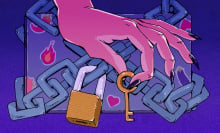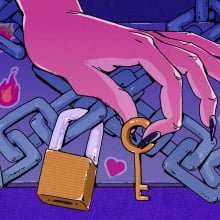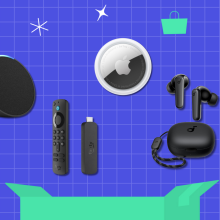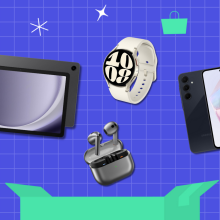So much of our lives are now lived online. From meeting partners via dating apps, starting a business from scratch and using social media to find clients, or attending work or education remotely, the online world is where we now spend a great deal of our time. But for women, girls, and marginalised people, the digital era also opened up new opportunities for harm and abuse.
Issues like image-based sexual abuse, deepfakes, sexist bias, and surveillance have come to the forefront of conversations around women and digital safety, but harms continue to persist as legislation is slow to catch up. But women are fighting back to ensure that the digital age serves women rather than excludes them, and to insist that the online world is one that we can exist in safely and unapologetically.
In honour of International Women’s Day, we’re spotlighting a list of the women and organisations that are working to make our digital world a safer and more empowering place for women and girls.
Seyi Akiwowo, founder of Glitch
At the age of 23, Akiwowo was elected as the youngest Black female Councillor in East London; a monumental achievement. For Akiwowo, what should have been a cause for celebration ended up being an experience which subjected her to viral online abuse. When the speech she gave to the European Parliament calling out racism went viral, she was met with the full force of online abuse. By using her platform to launch a campaign to "Fix the Glitch," this led her to found Glitch, a not-for-profit which delivers workshops on digital safety and wellbeing. Following their joint campaign with the End Violence Against Women Coalition, the UK government integrated women and girls’ safety into the Online Safety Act, and Glitch are now calling for all political parties to address online abuse in their political manifestos. Her book How To Stay Safe Online is a practical handbook for women and marginalised genders, equipping them with the tools to protect our digital wellbeing.

Georgia Harrison, campaigner and reality TV star
Image-based sexual abuse went from being a personal battle that many victims battled in private to a national campaign when Love Island star Georgia Harrison took her ex-partner Stephen Bear to court for non-consensual sharing. In 2020, Bear had uploaded an intimate video of them on his OnlyFans account, and soon after ‘Georgia Harrison sex tape’ became a top Google search. But after taking the courage to waive her right to anonymity, her campaigning led to a monumental change in the law. It removed the need for intent to cause distress or humiliation for non-consensual sharing to be prosecuted, therefore making it much easier to prosecute and giving countless victims a better chance of justice against this type of digital abuse.

Joy Buolamwini, founder of the Algorithmic Justice League
Computer scientist Joy Buolamwini was a scholar at MIT’s Media Lab working on her first design project at the institution when she experienced first hand the impacts of racial bias on digital technology. Buolamwini created what she called the Aspire Mirror, which used face-tracking software to register the movements of the user and overlay them onto an aspirational figure. When she realised the facial recognition wouldn’t detect her until she was holding a white mask over her face, she was confronted face on with what she termed the "coded gaze". She soon founded the Algorithmic Justice League, which exists to prevent AI harms and increase accountability. Since then, she has written Unmasking AI, her debut bestselling book on redesigning and reclaiming AI for the good of humanity. In an age where algorithms are replacing humans, this accountability and transparency is essential to preventing technology from creating new risks or entrenching existing inequalities.

Elena Michael, Director and Co-Founder of Not Your Porn
Not Your Porn is a survivor-led organisation that supports women and girls who have experienced image-based sexual abuse. Michael got involved in Not Your Porn while at law school. Michael and Kate Isaacs, who started the campaign, got in contact over Twitter and since then Michael has gone on to run the campaign with two fellow campaigners. Michael directs Not Your Porn alongside her day job working in support services for neurodivergent children and adults.
In 2024, Not Your Porn will be launching their Survivor Network, which aims to provide a safe space for survivors and raise greater awareness of image-based sexual abuse. In Feb. 2024, Not Your Porn signed a joint letter to Ofcom alongside 43 other specialist organisations and experts, warning that they are not effectively tackling illegal content relating to stalking, harassment and image-based sexual abuse, which is preventing a safer internet for women.
European Sex Workers Alliance
When it comes to online safety, sex workers are often overlooked. Due to the criminalisation of sex work in many countries, the human rights of sex workers are often ignored and not upheld, meaning that they experience disproportionate harms and digital risks. European Sex Workers Alliance are using the lived experiences of sex workers to shape and influence EU and national policymaking, ensuring that sex workers’ voices are heard and their rights protected.
From their recent lobbying, they got big porn platforms included in the list of Very Large Online Platforms, meaning that the EU’s new Digital Services Act will impose the same accountability and transparency rules on large porn platforms that social media giants are subject to. In April 2024, they are hosting the first Convention on Sex Work, Technology and Human Rights: Digital Rights for All, to bring sex workers and digital rights activists together to learn and collaborate.
Alice Hendy, Founder of R;pple
Any loss is immensely painful, but loss to suicide is something that changes you forever. Alice Hendy lost her brother Josh to suicide in 2020, when he was aged 21. After looking through his laptop, she realised that Josh was looking at harmful content online before his death, Hendy founded R;pple, a web browser extension that intercepts when people are at their most vulnerable. Once downloaded, if someone searches for content relating to suicide or self-harm, it signposts people to mental health resources and services that can help.
The work that Hendy has done to prevent suicide and intervene when people are at their lowest is changing lives already; 24 individuals have come to them directly to say they’re still here because of R;pple’s interventions. Hendy was awarded an MBE this year for her services, demonstrating the transformative power that tech designed for good can have on our safety and wellbeing.
Sneha Revanur, founder of Encode Justice
At age 15, Revanur founded Encode Justice, a youth led AI-focused civil society group, to rally against the adoption of a risk-based algorithm in replacement of cash bail. In the three years since its founding, the organisation has grown from her home state of California, to an international movement of 800 members across 30 countries. Encode Justice has contributed to restriction of surveillance in multiple states, spearheaded advocacy for over 10 pieces of federal legislation and helped shape the White House’s Bill of Rights for an Automated Society and President Biden’s executive order on AI. Listed as one of TIME’s 100 AI, she is a groundbreaking Gen Z organiser, who recognises the radical potential and vital role that younger generations play in shaping our digital world for the better.

Black Girls Code
We are becoming increasingly aware of the importance of closing the STEM gender gap, in an age where technology shapes so many aspects of our lives. The gaps in representation in tech teams results in biased products, be it racist facial recognition software or sexist chatbots. Historically, women have been excluded from the tech industry, and women of colour in particular are historically underrepresented in tech, with just 3 percent of Black women making up the IT workforce. This is what led to the creation of Black Girls Code, which aims to get 1 million girls of colour in tech by 2040. Founded in 2011 by Kimberly Bryant, an African American electrical engineer, the organisation reached over 2.5 million girls and young women in 2023 alone. By closing the STEM gender gap and focusing on girls and women of colour aged between seven and 25, this organisation is making our digital world feminist by design.

Hera Hussain, founder of Chayn
Hera Hussain was born in the UK but grew up in Pakistan. After helping two friends escape abusive marriages and realising the challenges to finding basic information about their rights and how to cope with gender-based trauma. This led her to found Chayn, a survivor-led non profit organisation that provides women experiencing abuse with online resources and services in multiple languages.
The resources Chayn provides are free and written by survivors and trauma experts from around the world, ranging from guides on online safety to video courses on healing from image-based abuse and toxic relationships and getting one-to-one reflective support through chat from their Bloom project. More than 500,000 people have benefited from Chayn's services since 2013. In order to make technology safer by design, they also do research on how technology can be made trauma-informed so there’s less abuse.

If you have experienced sexual abuse, if you are based in the U.S., call the free, confidential National Sexual Assault hotline at 1-800-656-HOPE (4673), or access the 24-7 help online by visiting online.rainn.org. If you have had intimate images shared without your consent, call the Cyber Civil Rights Initiative’s 24/7 hotline at 844-878-2274 for free, confidential support. The CCRI website also includes helpful information as well as a list of international resources.
If you are based in the UK and have experienced intimate image abuse (aka revenge porn), you can contact the Revenge Porn Helpline on 0345 6000 459. If you have experienced sexual violence and are based in the UK, call the Rape Crisis helpline 0808 802 9999.
If you're feeling suicidal or experiencing a mental health crisis, please talk to somebody. You can reach the 988 Suicide and Crisis Lifeline at 988; the Trans Lifeline at 877-565-8860; or the Trevor Project at 866-488-7386. Text "START" to Crisis Text Line at 741-741. Contact the NAMI HelpLine at 1-800-950-NAMI, Monday through Friday from 10:00 a.m. – 10:00 p.m. ET, or email [email protected]. If you don't like the phone, consider using the 988 Suicide and Crisis Lifeline Chat at crisischat.org. Here is a list of international resources.
Topics Activism Social Good













